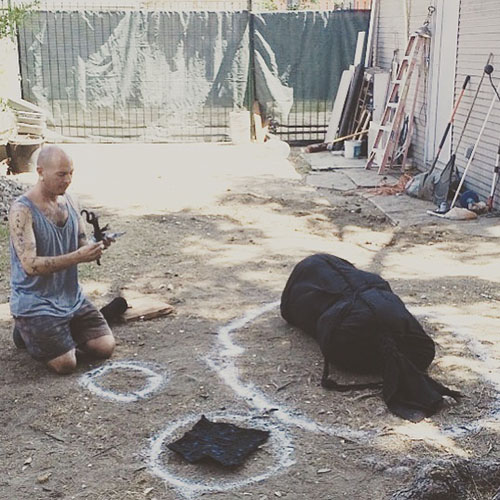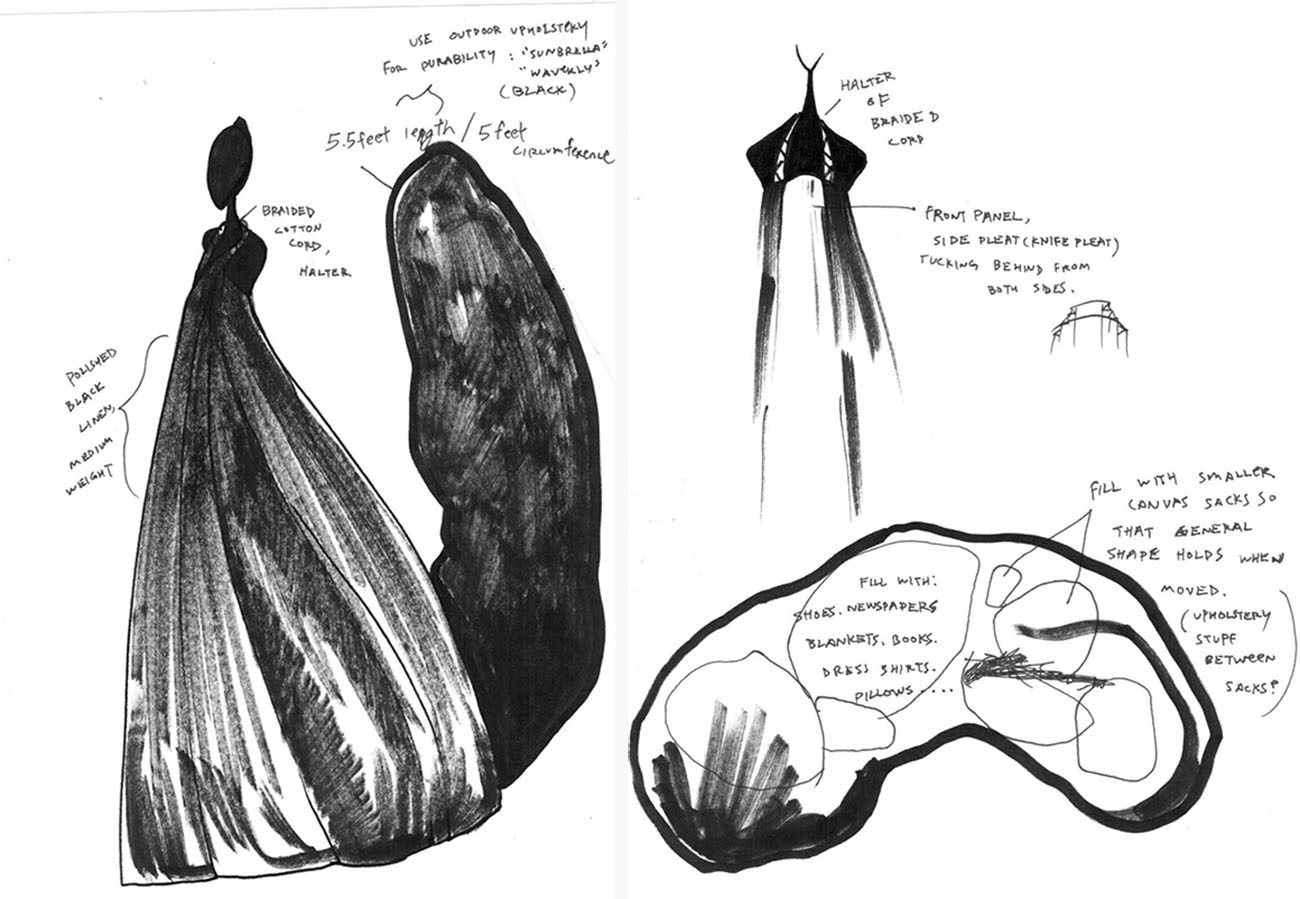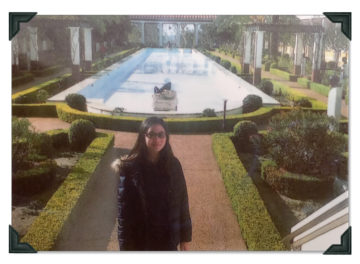The multitalented Los Angeles-based artist and performer Gregory Barnett meticulously created a costume for dance artist taisha paggett’s performance at the Getty Villa, Mountain, Fire, Holding Still. This performance-as-vigil unfolded over the course of August 27, 2016 as a meditation on blackness in antiquity and today. Here, Barnett shares notes and images from his design process, in which he gives material form to the metaphors of weight, ritual, mourning, and adornment that are at play throughout the performance.
Gregory’s concept has multiple pieces, each of which is a work of art unto itself. taisha will wear the Shadow Mountain Gown With Eight Knot Ogun Braid, a dress of linen and horsehair to which is attached the Literal Weight JuJu Body Bag, a large object that has been packed with men’s shoes and other objects, and weighs 50 pounds. Also attached to the dress, near taisha’s face, is the Death Handkerchief/Heart Armour/Liberation Map. Finally, she will carry a LaurelBranchWandDagger. The objects were designed with a belief in performance being a practice of devotion. The objects were understood as prayer talismans more so than theatrical props.
Concept Sketches
The goal of the Shadow Mountain Gown with the Literal Weight is for taisha to read both as a mountain and a shadow. The box pleat on the back of the dress, made of polished linen, allows flow as taisha moves. Along the hem, horsehair lining maintains the shape of the silhouette. The Weight is supposed to read as a partner shadow to taisha’s form; they work in tandem.
The contents of the sculpture are important both in terms of metaphorical meaning and in creating the desired shape of the object as a sizeable weight. The idea is to convey something between body bag and juju bag. It is a symbol meant to suggest taisha literally holds memory.

Gregory’s sketch of the Death Handkerchief.
The death handkerchief was created because we wanted to obscure taisha’s face. It interweaves strips of black fabric, echoing mosaics, and is probably the clearest reference in the costume to the omnipresent ash from the eruption of Mount Vesuvius. The variation of color is equalized by monochrome black ash encompassing everything; the pristine preservation of a society is directly linked to the destruction of its original context.

Gregory’s sketch of the LaurelBranchWandDagger.
At first, I wanted to create a funeral wreath for taisha, similar to one shown in the galleries at the Getty Villa. Paired with the gown, though, it ended up looking too Fellini-esque for me, so I decided to instead create a laurel branch for her to carry or wear in her hair. There was something about the small size and general fragility of the laurel branch in comparison to its cumbersome weight and large size (about five feet long). A classic symbol of life and victory being ridiculously trumped.
Assembling the Literal Weight

Gathering supplies for stuffing the Weight: 35 pounds of black fabric remnants.
Here’s a list of the current contents of the Literal Weight:
- four pairs of men’s shoes
- multiple bags of black salt and plant ashes
- several books and letters
- a collection of hair combs (a classic funerary offering in Herculaneum and Pompeii)
- blankets
- pillows
- fabric scraps
Baggage meets nostalgia meets amulets meets leftovers meets whatever else.

Nothing went into the Weight without first being washed in black salt and incense. I am a sucker for ritual, the smells and bells of which fortify the objects. And, it would feel irresponsible to ask taisha to carry a 50-pound sculpture for ten hours without somehow blessing it.

Shoes in the Weight.
Several pairs of men’s shoes were sewn into the inside of the bag. Each pair signifies a life/death (or many lives/deaths). They break the smoothness of the bag’s silhouette. These are bumps in the flow, literally and otherwise.

Small bags of California white sage and yerba santa smudge ashes were also sewn inside the Weight. I used native plants to acknowledge what’s underneath the architecture of the costume—that this structure was built on something that was pre-existing.

The completed Weight
I sewed the contents of the Literal Weight into its lining so as to maintain the shape of the object. Several bags were sewn along the inside of the Literal Weight so that the contents don’t collect at the bottom. (They remind me of the placement of organs in a human, or the giblet sack in a cooking turkey.) The rope around the middle allows the sculpture to “bend at the waist” like an additional body in the performance.
The LaurelBranchWandDagger

The LaurelBranchWandDagger. So much for shying away from Fellini. #SatyriconGoals
For the base of the LaurelBranchWandDagger, I reused the dagger that artist Rafa Esparza whittled during the piece he performed this summer in Elysian Park, “RED SUMMER, freedom is an endless meeting. and i don’t miss your heat. but here we are again.” The idea of performance being regenerative means a lot to both of us, as well as to taisha.
The laurel leaves are made from vintage (1920s) hat decorations found at my favorite source of inspiration, the California Millinery Supply in Downtown Los Angeles. The place is a hidden gem and I will find any excuse to head there.
Fitting the Costume
Designer Dusty Paik worked with me on taisha’s Shadow Mountain Gown. She is an absolute genius when it comes to fabric; I have never worked with someone who could pleat a narrative so clearly. She works with a keen awareness of how referencing time and space in the construct of a garment (via line, historical detailing, and abstraction) works to create emotive and evocative imagery.

Fitting the Shadow Mountain Gown on taisha. There are eight knots total for the protection of Ogun (Ifa warrior god of smiths and craftsmen). I singed the ends of the braids to seal them as cords, but also as a reference to taisha running from fires.

Designer Dusty Paik at work with taisha.

Crafting vs. witchcraft: six of one, half a dozen of the other. “Witchcraft” is not much more than trusting that your internal thoughts carry external weight.

taisha familiarizing herself with the LaurelBranchWandDagger.

The costume at completion: Shadow Mountain Gown With Eight Knot Ogun Braid, Laurel BranchWandDagger, Literal Weight JuJu Body Bag, Death Handkerchief/Heart Armour/Liberation Map.
I wholly believe in art, both performance and visual, as microcosms. They are dioramas of what you want to see on the macrocosm or “real life.”
Text of this post © Gregory Barnett. All rights reserved.
______
Mountain, Fire, Holding Still was a performance/installation by dance artist taisha paggett and sound artist Yann Novak created in collaboration with visual artist Gregory Barnett and movement artist Marbles Jumbo Radio. Presented in the Outer Peristyle of the Getty Villa, it was a meditation on death, labor, and blackness in antiquity as it relates to the contemporary body, and a performance-as-vigil for past and future lives. The performance took place on Saturday, August 27, 2016 from 10:00 a.m. to 8:00 p.m.
Related Posts
Exploring Blackness in Antiquity Through Movement and Sound





Comments on this post are now closed.
Trackbacks/Pingbacks